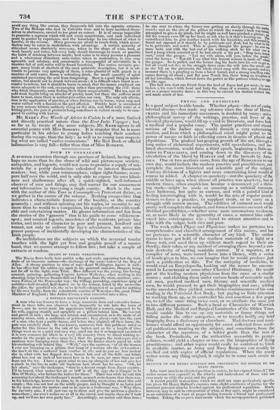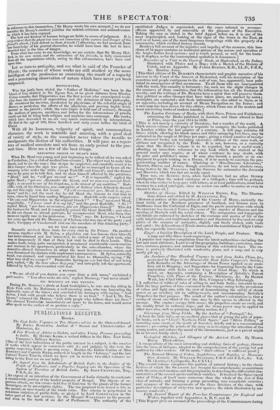PHYSIC AND PHYSICIANS
Is a good subject in able hands. Whether physic—the art of curing internal disease—has made any advance since the time of HIPPO. CRATES and his immediate successors, is doubted by many ; and a philosophical survey of the writings, practice, and lives of the classical physicians, would fill up a void in literature, and form both a medical and a popular essay. The quaint practices and absurd notions of the darker ages would furnish a very entertaining section, and from which a philosophical mind might point to the power of nature or faith in effecting cures in despite of physic and physicians. The gradual but groping growth of the art, through a long series of alchemical experiments, wild speculations, and iso. fated observation, would form a third epoch, beginning a little au• terior to PARACELSUS, and coming down to the discovery of the circulation of the blood by Ihaystr and of the lacteals by ASEL. LIUS. One or two sections more, from the age of SYnExiiitai to our own day, would include the modern practice and practitioners, and complete the more historical and scientific part of the subject. Various divisions of a lighter and more entertaining kind would of course be added. A chapter on quackery—not the quackery of the middle or later ages, when almost all practice was quackery, but of modern times, when empiricism became a denounced yet a thriv. ing trade—might be made as amusing as a satirical romance. Less ludicrous, but quite as curious, and with a painful kind of feeling intermingling with it, would be the arts of regular practi• tioners to force a practice, to supplant rivals, or to carry on a struggle with narrow means. The oddities of eminent men would pretty well complete the subject, and form a humorous account of in- dividual pecnliarities,—whether sonic mere unconscious weakness, or, as more likely in the generality of cases, a natural bias culti- vated into extravagance whe t round to attract attention and to take with the vulgar, both rich and poor. The work called Physic and Physicians makes no pretence to a comprehensive and classified arrangement of this nature, and has no pretence to a scientific character of any kind. The author seems to have got hold of the readiest materials of a light or a flimsy sort, and used them up without much regard to their au- thority, their value, or any method of arranging them beyond a cer- tain dexterity of setting readable matter. If a reporter, or a compiler of news, were turned loose into a library, with a series of heads given to him, we can imagine that he would produce just such a publication as this. For the antiquity of medicine, he would read an Encyclopedia, looking out the names he encoun- tered in LEMPRIERE or some other Classical Dictionary. He would get at the leading modern physicians from the sante or a similar source ; and clubbing them under various heads of eccentric medi- cal men, poetical medical men, literary and scientific medical men, he would proceed to get their biographies and ins; addling to the anecdotes they yielded, some choice reminiscences of his own reading in the Universal Jest Book ; but paying so little attention to working them up, as to contradict his own assertion a few pages on, to tell the same thing twice over, or to attribute the same jest to two different persons. Such it head as Chronicles of Warwick Hall, and the Medical and Surgical Luminaries of the Olden Time, would enable him to use up any materials or thinly things not falling under the other categories, or to transfer bodily any brief biography from a dictionary or elsewhere. Mad doctors and mad- houses would afford an opportunity for cases collected from medi- cal publications treating on the subject, and sometimes, from the character of the reporters, of a loftier grade than the rest of the book. Periodicals, or the authorities accessible to penny- a-liners, would yield a chapter or two on the biographies of living practitioners and other topics would easily be contrived to hitch in available matter, as Army and Navy Surgeons can readily be swelled out with copies of official regulations. When the ready writer wrote any thing original, it might be in some such strain as this DLEENCE OF SIR HENRY nitroun FOR PREFERRING HIS DINNER TO MS
DYING FRIEND.
Like mast men in an elevated position in society, lie has exposed himself [The writer means been exposed] to the attacks and malevolence of those who are ever ready to vilify the great and the good. A recent painful transaction, which we shall not more particularly specify, has given Sir henry Halthrd's enemies some slight semblance of justice for the constant personal attacks levelled against his professional reputation. Much, however, any lie said in extenuation of what, at first sight, might be considered as an exhibition of a want of proper feeling towards a friend and professional brother. Taking the ex parte statements which the newspapers have published
HIPPOCRATES,
Who has justly heels styled the "Father of Medicine," was born in the island of Cos, situated in the Egean Sea, first no great distance from Rhodes. Cebu remarks, that Hippocrates was the first person who emancipated medi- cine from the trammels of superstition and the. delusions of false philosophy. Be considered the doctrine, inculcated by physicians, of the celestial origin of disease, as paralyzing the otiorts of the physician, and proving highly detri- mental to the patient ; while the vain hopes it held out of recovery, through the medium of prayers, sacrifices, and bribes for the intercessions of priests, could not fail to bring both religion and medicine into contempt. His works, which have descended to us, are very much contaminated by interpolation. He died at the age of 100, three hundred and sixty years before the birth of Christ.
With all its looseness, vulgarity of spirit, and commonplace character, the work is readable and amusing, with a good deal of variety of style, as the compiler never takes the trouble to amalgamate the diction of his authorities. It will pass as a reper- tory of medical anecdote and wit from an early period to the pre- sent time. Here are a few of the best things.
REPORTED ORIGIN 01' MEAD'S RISE.
When Dr. Mead was young, and just beginning to be talked of, he was asked to Carshalton, [to a club of medical hod-vivants]. The object was to make him drunk, and to see the man ; this design he suspected, and carefully avoided to fill a bumper when the sign was given. And lie so managed as to see all the compony retire under the table, except Radcliffe and himself; and the former was so far gone as to talk fast, and to show himself affected by the potations. "Mead," said lie, a will you succeed we?" "It is impossible," replied the polite Mend ; "you are Alexander the Great, and no Mali can succeed Rad- cliffe; to succeed to one of his kingdons, is the 'utmost if my ambition." Rad- cliffe, with all his bluntness, was susceptible of flattery when delicately dressed up, sad this reply won his heart. "1 ICin ITC0111MI'lld ny pa- tients," said he; Dud the next day he did Mend the honour to visit lion in town, when he found him reading Hippocrates. Radcliffe with surprise asked, "Do you read Hippocrates in the original Greek ?" " Yes," answered Mead,
respectfully. "I never read it in my life," said the great Radcliffe. " !" replied Mend, "you have no occasion, you are Hippoerates himself." This did the business for Mend, and it completely gained the blunt Radcliffe ; and when he did not choose to attend patients, lie reconimended Mend, who from that moment rapidly rose in his profession. "'Phis," says Dr. Lettsom, " I heard ten years ago from old 1)r. Alounsey of Chelsea, who was one of the party ; and slice, Crespigny of Camberwell told inc the anecdote of this drinking party."
GO EY THE PAY-DOOR.
Dumoulin received three louis for every visit to the Prince. On another occasion, together with M. Sylva, a physician not less famous than himself; but better informed and less interested, he visited a man of high rank, who was so dangerously ill that at their last visit he died in their hrinds. This sudden death, being quite unexpected, it occasioned considerable consternation and murmur in the apartment, particularly in the ante-chamber, where the domestics allowed themselves to adopt the most licentious conversation, and even threatened the doctors with unpleasant consequences. M. Sylva, naturally timid, was alarmed, and communicated his fears to Dumoulin, saying, " By what door shall we escape ? " Dumoulin, having no fear but that of not being paid, replied, "By the door where they pay," and intrepidly left the apartment, followed by Sylva, who trembled with fear.
A RETORT.
a We are afraid of you doctor, you come from a sick room," exclaimed a petit maitre. " You often make use sick," replied Mounsey, "but never afraid."
DR. MOUNSEY ON THE TRINITY.
During Dr. Mounsey's abode at Lord Godolphin's, he was one day riding in Hyde Park with Mr. Rubinson, a well-meau ing. man, who was lamenting the deplorable state of the times ; and concluded his harangue with saying, " And doctor, I talk with people who believe there is no God." "And I, Mr. Ro- binson," returned the Doctor, "talk with people who believe there are three." The alarmed Trinitarian' immediately set spurs to his horse, and would never after speak to the author of so protline a reply."
• reference to this transaction, [Sir Henry wrote his. own account;] we do not lenonr:ider Sir Henry's conduct justifies the unkind criticism and animadversion
to which it has been exposed. The best and kindest of human beings are liable to errors of judgment. It is
Try evident that the physician was not conscious of ature and danger of his friend's attack, [God defend us from friends ] otherwise, I we feel assured, from our knowledge of his general character, be would have been the last to have deserted kiln in the time of danger. From what has conic to our knowledge, we are certain that Sir Henry Hal- ford, in his own wind, and the estimation of his friends, is fully exonerated from all the imputations which, owing to this circumstance, have been cast
upon him.
Let us turn to antiquity, and see what is said of the Founder of Physic; the remains of whose works are still studied by the more intelligent of the profession as containing the result of a sagacity and a penetrating observation of nature which have never yet been
surpassed.



























 Previous page
Previous page